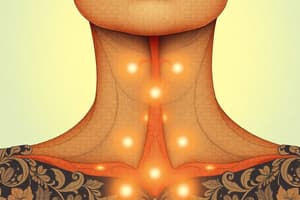Podcast
Questions and Answers
What is the effect of increased thyroid hormone on plasma fat concentrations?
What is the effect of increased thyroid hormone on plasma fat concentrations?
- Decreases triglycerides levels (correct)
- Increases phospholipid levels
- Maintains triglycerides levels
- Increases cholesterol levels
What happens to plasma cholesterol levels during prolonged hypothyroidism?
What happens to plasma cholesterol levels during prolonged hypothyroidism?
- Cholesterol levels increase drastically (correct)
- Cholesterol levels remain unchanged
- Cholesterol levels fluctuate widely
- Cholesterol levels decrease significantly
How does thyroid hormone affect liver cells in relation to low-density lipoproteins?
How does thyroid hormone affect liver cells in relation to low-density lipoproteins?
- Decreases the number of LDL receptors
- Increases the number of LDL receptors (correct)
- Alters the LDL receptor function
- Has no effect on LDL receptors
What is a consequence of excess thyroid hormone on vitamin requirements?
What is a consequence of excess thyroid hormone on vitamin requirements?
What is the potential increase in basal metabolic rate due to excessive thyroid hormone?
What is the potential increase in basal metabolic rate due to excessive thyroid hormone?
What effect does the absence of thyroid hormone have on the basal metabolic rate?
What effect does the absence of thyroid hormone have on the basal metabolic rate?
What is a common result of greatly increased thyroid hormone levels?
What is a common result of greatly increased thyroid hormone levels?
Which of the following mechanisms helps lower plasma cholesterol concentrations due to thyroid hormone?
Which of the following mechanisms helps lower plasma cholesterol concentrations due to thyroid hormone?
What is a common cause of the enlarged thyroid gland in idiopathic nontoxic colloid goiter?
What is a common cause of the enlarged thyroid gland in idiopathic nontoxic colloid goiter?
Which enzyme deficiency is associated with the inability to recover iodine from iodinated tyrosines?
Which enzyme deficiency is associated with the inability to recover iodine from iodinated tyrosines?
How do goitrogenic substances contribute to thyroid enlargement?
How do goitrogenic substances contribute to thyroid enlargement?
Which of the following is NOT one of the enzyme deficiencies related to abnormal thyroid hormone formation?
Which of the following is NOT one of the enzyme deficiencies related to abnormal thyroid hormone formation?
What is the typical secretion pattern of thyroid hormones in patients with idiopathic colloid goiter?
What is the typical secretion pattern of thyroid hormones in patients with idiopathic colloid goiter?
What is the required amount of ingested iodine for the normal formation of thyroxine each year?
What is the required amount of ingested iodine for the normal formation of thyroxine each year?
What is the purpose of iodizing common table salt?
What is the purpose of iodizing common table salt?
How much concentration does the iodide pump normally achieve in the thyroid gland compared to blood concentration?
How much concentration does the iodide pump normally achieve in the thyroid gland compared to blood concentration?
Which factor most significantly influences the rate of iodide trapping by the thyroid?
Which factor most significantly influences the rate of iodide trapping by the thyroid?
What is the molecular weight of thyroglobulin?
What is the molecular weight of thyroglobulin?
What portion of iodides ingested orally is typically removed by the thyroid gland for hormone synthesis?
What portion of iodides ingested orally is typically removed by the thyroid gland for hormone synthesis?
What mechanism describes the transport of iodides from the blood into thyroid glandular cells?
What mechanism describes the transport of iodides from the blood into thyroid glandular cells?
What occurs to the activity of the iodide pump in thyroid cells after hypophysectomy?
What occurs to the activity of the iodide pump in thyroid cells after hypophysectomy?
What is the primary substance that thyroxine is converted to in the body?
What is the primary substance that thyroxine is converted to in the body?
How do thyroid hormone receptors typically interact with DNA?
How do thyroid hormone receptors typically interact with DNA?
What is a key outcome of thyroid hormone action on the cell?
What is a key outcome of thyroid hormone action on the cell?
What effect do thyroid hormones have on the basal metabolic rate?
What effect do thyroid hormones have on the basal metabolic rate?
What occurs to the mitochondria in response to thyroxine or triiodothyronine administration?
What occurs to the mitochondria in response to thyroxine or triiodothyronine administration?
What dual effect do thyroid hormones have on protein synthesis and catabolism?
What dual effect do thyroid hormones have on protein synthesis and catabolism?
Which of the following effects is NOT associated with an increase in thyroid hormones?
Which of the following effects is NOT associated with an increase in thyroid hormones?
What percentage of thyroid hormone molecules that bind with receptors is typically triiodothyronine?
What percentage of thyroid hormone molecules that bind with receptors is typically triiodothyronine?
What is the primary function of triiodothyronine (T3) compared to thyroxine (T4)?
What is the primary function of triiodothyronine (T3) compared to thyroxine (T4)?
Which hormone primarily regulates thyroid secretion?
Which hormone primarily regulates thyroid secretion?
What happens to the basal metabolic rate in the absence of thyroid secretion?
What happens to the basal metabolic rate in the absence of thyroid secretion?
What is the main component of the colloid in the thyroid gland?
What is the main component of the colloid in the thyroid gland?
How much of the thyroid gland's secreted hormones is typically thyroxine?
How much of the thyroid gland's secreted hormones is typically thyroxine?
What structural feature characterizes the thyroid gland?
What structural feature characterizes the thyroid gland?
What is the approximate weight range of the thyroid gland in adults?
What is the approximate weight range of the thyroid gland in adults?
Which of the following statements is true regarding the conversion of thyroxine to triiodothyronine?
Which of the following statements is true regarding the conversion of thyroxine to triiodothyronine?
Flashcards are hidden until you start studying
Study Notes
Overview of the Thyroid Gland
- Located below the larynx, anterior to the trachea, the thyroid gland is one of the largest endocrine glands, weighing 15 to 20 grams in adults.
- Secretes two main hormones: thyroxine (T4) and triiodothyronine (T3), which significantly increase metabolic rates.
Hormonal Functions and Effects
- Complete lack of thyroid secretion can lower the basal metabolic rate by 40-50%, while excess secretion can elevate it by 60-100%.
- Thyroxine accounts for about 93% of thyroid hormones, and triiodothyronine makes up 7%, with T3 being four times more potent than T4.
- Thyroid hormones enhance metabolic activity across almost all body tissues, stimulating food utilization for energy and increasing both protein synthesis and catabolism.
Structure and Composition of the Thyroid Gland
- The thyroid consists of numerous follicles filled with colloid and lined with cuboidal epithelial cells that secrete hormones.
- Colloid contains thyroglobulin, a large glycoprotein that stores thyroid hormones.
- High blood flow to the thyroid is noted, approximately five times its weight per minute.
Iodine Requirement and Hormone Formation
- Each year, around 50 mg of iodine is necessary for adequate thyroxine production (about 1 mg per week).
- Iodized salt is commonly used to prevent iodine deficiency, with a ratio of 1 part sodium iodide to 100,000 parts sodium chloride.
Iodide Handling and Absorption
- Iodides ingested are absorbed from the gastrointestinal tract, with most rapidly excreted but about one-fifth retained by the thyroid.
- "Iodide trapping" actively transports iodides into thyroid cells, concentrating them up to 30 times the blood level, potentially 250 times during max activity.
Synthesis of Hormones
- Thyroglobulin is synthesized by thyroid cells and stored in follicles for hormone production.
- Triiodothyronine is formed by the removal of one iodide from most thyroxine molecules.
- Intracellular hormone receptors have a strong affinity for T3, with over 90% of binding occurring with T3.
Regulatory Mechanisms
- TSH (thyroid-stimulating hormone) from the anterior pituitary gland primarily regulates thyroid hormone secretion.
- Thyroid receptors, upon hormone binding, activate gene transcription, leading to the formation of various proteins that influence metabolic activities.
Metabolic Effects of Thyroid Hormones
- Increase in basal metabolic rate due to heightened metabolic activities; can lead to weight loss or maintenance.
- Enhances mitochondrial size and number, boosting cellular energy production.
Lipid Metabolism
- Increased thyroid hormone levels reduce plasma cholesterol, triglycerides, and phospholipids while raising free fatty acids.
- Low thyroid hormone levels can raise cholesterol levels and promote fat deposition in the liver.
Vitamin Requirements
- Elevated thyroid hormone secretion raises demand for vitamins due to increased enzyme production.
- A relative vitamin deficiency can occur if vitamin intake does not match increased requirements.
Conditions Related to Thyroid Hormone Levels
- Idiopathic Nontoxic Colloid Goiter: Enlarged thyroid glands can occur without iodine deficiency, potentially linked to mild thyroiditis and increased TSH levels.
- Abnormalities in thyroid hormone production can arise from enzyme deficiencies affecting iodide trapping, oxidation, coupling, and deiodination.
- Certain foods, like some turnips and cabbages, contain goitrogenic substances that can inhibit thyroid function and result in gland enlargement.
Studying That Suits You
Use AI to generate personalized quizzes and flashcards to suit your learning preferences.




